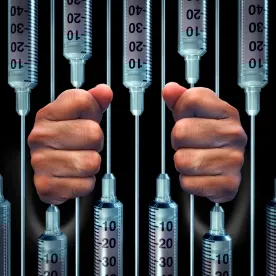Two decisions from the US District Court for the Southern District of Texas limit the extent to which relators can stretch the use of circumstantial evidence to support a False Claims Act case based on an anti-kickback or off-label marketing theory. In two separate decisions on December 10 and December 14 in US ex rel. King v. Solvay Pharmaceuticals, Inc. (SPI)., the court granted SPI’s summary judgment motion finding insufficient evidence for a reasonable juror to support either theory.
For the anti-kickback claim, relators alleged that SPI engaged in a number of activities, such as speaker programs, preceptorships, honorariums, free continuing medical education, and provided gifts such as dinners and event tickets, as part of a national scheme to illegally induce physicians to prescribe SPI’s drugs. In dismissing this claim on December 10, the court first found that the allegations of a nationwide scheme were unsupported because in relator’s response to interrogatories and expert report, only 46 Texas-based physicians were identified as having prescribed SPI’s drugs and as having allegedly received remuneration from SPI. The court observed:
[t]heoretically Relators could survive summary judgment with examples, the examples would have to be linked to remuneration from SPI, some evidence of intent that the remuneration would lead to claims, and claims for prescriptions written by these physicians that a reasonable juror could believe resulted from the unlawful remuneration. Additionally, to continue a claim on a national-level scheme, Relators would need to demonstrate that kickbacks were provided to physicians in different areas of the country as part of a nationwide scheme to increase prescriptions of the specific Drugs at Issue to patients who are on Medicaid or part of some other government prescription program.
Since relators provided no physician examples outside of Texas, the court ruled the multi-state claims failed.
The court then examined each of the alleged forms of remuneration and found that the evidence was insufficient to find SPI had the requisite “knowing and willful” intent to induce referrals to support an anti-kickback claim under federal or Texas law. For example, the “physician profile interview program” involved sales representatives interviewing physicians prior to the launch of the drug Aceon to obtain information about the physicians’ practice and treatment of hypertension. Physicians were paid $100 for participating in this 30 minute interview. Sales reps were instructed to not mention Aceon during these interviews. Relators offered no evidence that sales reps failed to follow this instruction. Not surprisingly, the court found that the evidence failed to show that SPI intended the program to induce physicians to write prescriptions for a drug they were not told about. For other forms of remuneration, the court found that relators offered no proof that the physicians who received the remuneration actually prescribed SPI’s drugs.
In a separate ruling on December 14, the court granted SPI’s summary judgment motion dismissing relators’ “fraud-on-DrugDex” theory. To be eligible for government reimbursement for an off-label use of a drug, relators alleged that off-label use has to be listed in one of several drug compendia that evaluate whether sufficient clinical research supports that off-label use (see 42 U.S.C. §§ 1396r-8(d)(1)(B)(I); 1396r-8(k)(6)). DrugDex is one of those compendia. Relators alleged that SPI inappropriately influenced and misled DrugDex to include certain uses for Aceon, AndroGel, and Luvox as medically accepted by allegedly suppressing publication of negative research papers and only publishing “smaller” studies. Relators also alleged that SPI “colluded with” DrugDex “so that the uses listed might be deemed eligible for reimbursement under various government health programs.”
The court, however, found no evidence that SPI had a duty to publish negative studies, much less that the evidence showed SPI suppressed their publication. As far as the “collusion” allegation, relators admitted that they did not have evidence of communications between SPI and DrugDex, but rather that “DrugDex invited undue influence and SPI took advantage” of this invitation. While “relators had substantial time to conduct discovery and obtain proof that SPI and DrugDex communicated and that SPI somehow influenced DrugDex,” the court found no such sufficient evidence in the record to put the question to a jury.
These decisions provide some comfort to defendants, including but not limited to pharmaceutical companies and healthcare providers, that courts will require relators to offer more than innuendo and assumptions to support an FCA claim — a serious allegation with potentially significant consequences. The ability of relators to pursue cases through the costly and lengthy discovery process on flimsy allegations takes some of that comfort away. In this case, the relators filed their original complaint in 2003 — 12 years ago. The Department of Justice decided to decline in 2011.




 />i
/>i

